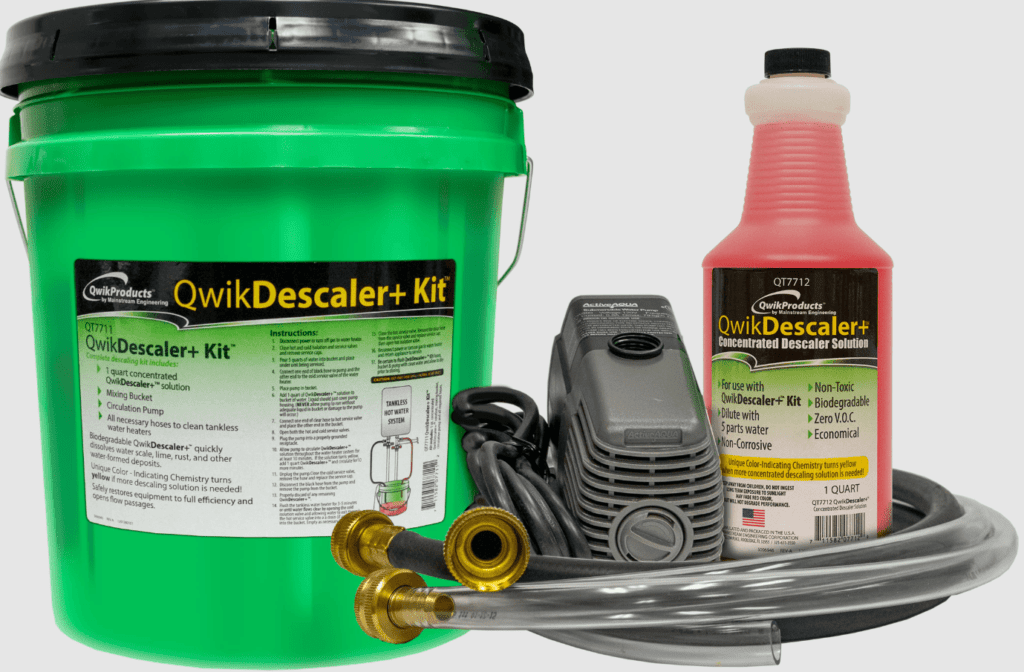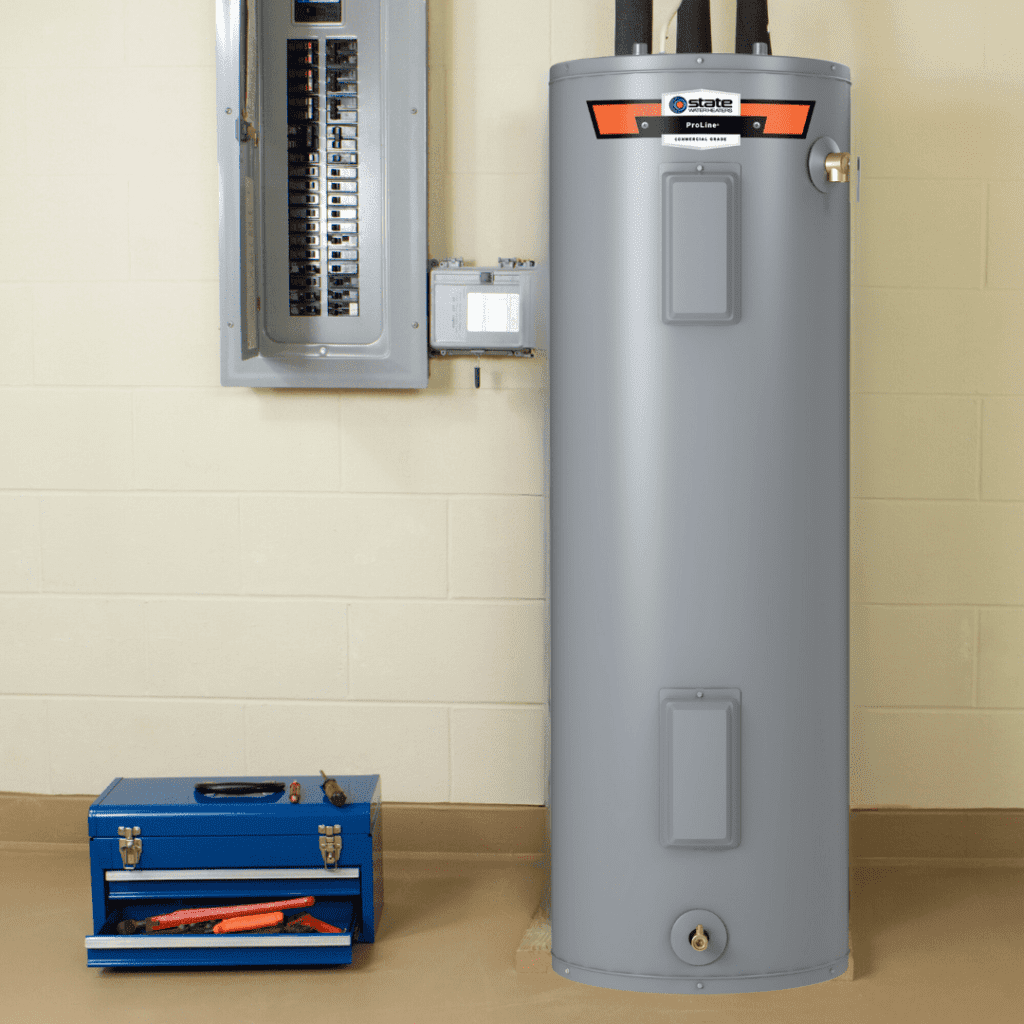Water Heater Maintenance
Like many other home appliances, water heaters require routine maintenance to operate efficiently and last as long as possible. One essential maintenance task for water heaters is descaling, which involves removing limescale buildup from the water heater tank. Limescale, a hard, chalky deposit of calcium carbonate, can greatly reduce your hot water heater’s efficiency and lead to potential damage if not dealt with. While descaling can be a DIY project, sometimes professional assistance is necessary to ensure the job is done correctly and safely.
In this blog, we will discuss the importance of descaling your water heater, how to know when it’s needed,a step by step guide to the descaling process, and how to decide whether you can handle it yourself or if you should call for professional help.
What is Descaling and Why is it Necessary?
Limescale, a hard, white deposit left behind when hard water evaporates from surfaces, primarily consists of calcium and magnesium. When these minerals accumulate, they form calcium carbonate and other compounds, creating what is commonly known as limescale. This buildup can significantly affect your water heater by reducing its efficiency and increasing your energy consumption. The layer of limescale acts as an insulating barrier, making it harder for the heating elements to transfer heat to the water. As a result, your water heater has to work harder and use more energy to heat the same amount of water, leading to higher energy bills.
Descaling is an essential maintenance task that helps prevent the negative impacts of limescale, ensuring that your water heater operates smoothly and efficiently. Keeping your water heater free of limescale buildup not only extends its lifespan but also saves on energy costs and lets you enjoy a consistent supply of hot water.
Signs Your Water Heater Needs Descaling
If you’re unsure of whether your water heater needs descaling, here are some symptoms to look out for:
- Reduced Hot Water Supply – If you’ve noticed a decrease in your hot water supply, it could be due to limescale buildup. Limescale buildup can reduce the tank’s capacity to hold hot water.
- High Energy Bills – If you are experiencing higher energy/utility bills, it may be due to your water heater working harder than necessary. This can be caused by the limescale buildup.
- Unusual Noises – Rumbling, banging, and other unusual noises coming from your water heater are common signs of limescale and other sediment buildup. Water gets trapped underneath the sediment, creating noises as it heats and moves.
- Inconsistent Water Temperature – When a buildup occurs in your water heater, you may experience fluctuations in your water temperature. The buildup in the tank makes it more difficult for the water heater to maintain a consistent temperature.
All of these symptoms point to one thing – it is time to descale your water heater. However, the frequency of descaling required is largely determined by the quality of your water. If your home has harder water, which contains higher levels of calcium and magnesium, your system is more prone to limescale buildup. In such cases, your water heater may need descaling every six months to a year to maintain its efficiency and prevent damage. Hard water speeds up the accumulation of mineral deposits, which can quickly impair your water heater’s performance.
On the other hand, if your home has softer water, which contains fewer minerals, the risk of limescale buildup is significantly reduced. In these conditions, descaling your hot water heater once a year or even once every two years may be sufficient to keep it running smoothly. Softer water results in less frequent maintenance needs because there are fewer minerals to form limescale deposits.
Also consider the unit’s age and manufacturer’s recommendations when diagnosing water heater performance issues. Older units or those with a history of limescale problems might need more frequent attention.
Step-by-Step Descaling Process
If you are expericning any of the signs above, then that means it’s time to descale your water heater. Here are a few simply steps to completing the descaling process.
Tank Water Heaters
- Turn Off Water & Power Supply – Make sure you turn the water heater off, and disconnect the water supply. Shut off the cold water supply valve.
- Drain Water Heater – This is an important step when performing maintenance on your water heater. You can drain your water heater by attaching a hose to the drain valve, and emptying the water into a suitable drainage area.
- Add Descaling Solution – Open the pressure relief valve and pour the descaling solution into the tank. Allow the solution to sit for the amount of time listed on the product label.
- Flush System with Clean Water – Use clean water to drain the descaling solution out of the water heater until all the residues are removed.
- Reconnect & Restart the Water Heater – Be sure to close the drain valve, refill the tank, and restore both the power and water supply.
Tankless Water Heaters
- Turn Off the Water & Power Supply – Shut off your unit and shut off both the cold and hot water valves.
- Attach Hoses to the Service Ports – Locate the service ports on your water heater (these can be found at the bottom of your system). Connect hoses to both ports for both hot and cold water.
- Circulate the Descaling Solution – Use a pump to circulate the descaling solution through the heater for the amount of time listed on the solution’s label.
- Flush with Clean Water – To rinse out the descaling solution, rinse your water heater with clean water until all residue is removed.
- Reconnect & Restart the Water Heater – Make sure to disconnect the hoses, close the service ports, and restore the water and power supply.
Following these steps will allow you to efficiently maintain your water heater systems. However, if symptoms persist and the system does not seem fully clean, it may be time to schedule your free estimate with a Logan Services expert.
DIY vs. Professional Descaling

Performing DIY descaling is possible, but sometimes it is important to recognize when calling on a professional becomes necessary. If you encounter persistent issues, then hiring a professional is recommended to avoid potential damage to your water heater.
When trying to DIY descale your water heater, you may run into risks such as using the incorrect solution, or incomplete descaling, which can lead to further issues. If you are uncomfortable with handling this process, lack the necessary tools, or have a complex water heater system, calling a Logan Services professional to help may be the best solution.
Preventive Measures to Avoid Frequent Water Heater Descaling
To increase and maintain the efficiency of your water heater, you can also utilize a water softener. Water softeners help protect your home appliances, like your water heater, by preventing the build-up of minerals, including calcium and magnesium – the main causes of limescale buildup in your water heater!
Another way to avoid frequent water heater descaling is by regularly flushing and performing maintenance. By flushing your water heater regularly, you are removing unwanted sediments, and also improving your system’s overall efficiency. Regular maintenance checks will help you catch any issues early on, increase the efficiency of your water heater, and help your system last longer.
Get Professional Plumbing Help From Logan Services
Regular descaling is necessary for maintaining the efficiency and longevity of your water heater. As discussed throughout the article, there are many different methods to utilize, symptoms to look out for, and reasons why descaling your water heater is so important. Whether it’s simple maintenance, or trying to prevent build-up in your water heater, descaling is very useful for keeping your hot water heater in good working order.
It is important to remember that a well-maintained water heater not only saves energy, but also provides reliable and clean hot water whenever you need it. Investing in professional water heater maintenance services can give you peace of mind and ensure that your water heater stays in excellent condition for years to come. Don’t wait for signs of trouble to appear—proactively maintaining your water heater with regular descaling is the best way to keep it running efficiently and effectively. Contact Logan Services to get started today!
FAQ About Descaling Water Heaters
How do I remove calcium from my water heater?
Using a descaling solution designed for water heaters is your best solution. Follow the steps outline above to ensure thorough cleaning.
How often should I descale my water heater?
How often you should descale your water heater depends on the hardness of your home’s water. If you have hard water, you want to try descale every 6-12 months. For homes with soft water, you can descale your system every 12-18 months.
How do you add vinegar to a hot water tank?
Vinegar can be a good descaling solution to use in your water heater tank. Make sure you turn off both the water heater and water supply, remove the anode rod, and then pour about a gallon of vinegar into the tank (using a funnel is recommended). Be sure to close the drain valve and allow the vinegar to soak for at least six hours. After soaking, reopen the drain valve and turn on the water. Be sure to completely flush out the vinegar and sediment before restarting the unit.
How do I descale a tankless water heater?
Tankless water heaters require different steps when descaling the system. Be sure to turn off the power and water, connect hoses to drain the system, and then add vinegar while submerging the pump and circulating the vinegar. Flush the water lines, and the remaining components, and then turn your water and gas back on.




















